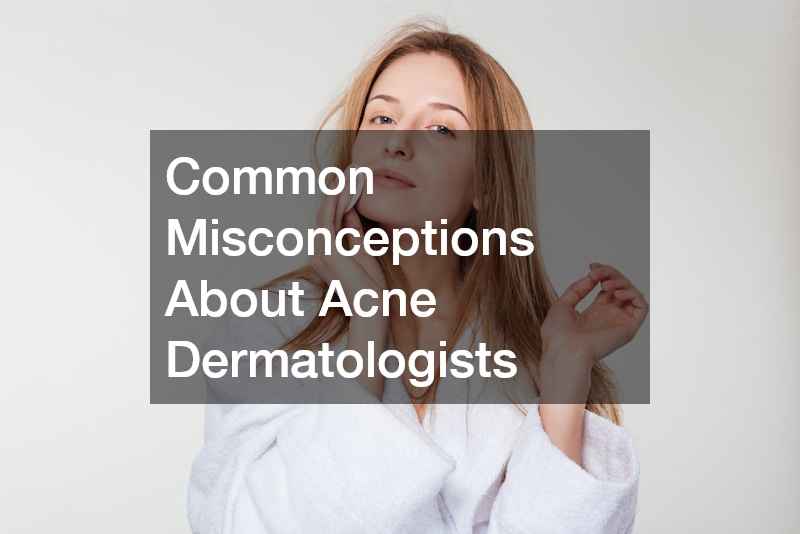Understanding the role of dermatologists in acne treatment is crucial for effective management. This article explores common misconceptions surrounding acne dermatologists and highlights the importance of professional advice in skincare. Despite the wealth of information available online, many individuals still hold onto myths that can hinder their path to clear skin.
By shedding light on these misconceptions, we aim to empower individuals to seek the right help for their acne issues.
Dermatologists Only Treat Severe Cases of Acne
One prevalent misconception is that dermatologists only see patients with severe or cystic acne. This generalization overlooks the complexity of acne as a skin condition, which can vary greatly in severity and type. Dermatologists are trained to address all forms of acne, from mild comedonal acne to more inflammatory variants. They can diagnose underlying issues contributing to acne that patients may not even be aware of.
Moreover, even individuals with mild acne can benefit from a dermatologist’s expertise. They can provide tailored skincare routines and treatments that can enhance a patient’s results significantly. It’s also essential to recognize that early intervention can prevent acne from worsening, making a visit to a dermatologist a wise choice for anyone experiencing breakouts.
Ultimately, the role of a dermatologist extends beyond treating severe cases; it also includes preventative care and management of common skin conditions. Thus, anyone struggling with acne, regardless of severity, should consider consulting a dermatologist for effective guidance.
Over-the-Counter Products Are Just as Effective as Prescription Treatments
Another misconception is that over-the-counter (OTC) products can deliver the same results as dermatologist-prescribed treatments. While some OTC products can be effective for mild acne, they often do not contain the higher concentrations of active ingredients that dermatologists might prescribe. Treatments such as topical retinoids or antibiotics are generally more potent and are tailored based on an individual’s unique skin needs.
Furthermore, the active ingredients in OTC products may not address all the underlying causes of acne, such as hormonal imbalances or bacterial infections. Many individuals find that their acne persists despite using various OTC products, which can lead to frustration. Consulting a dermatologist provides access to a range of treatment options, including prescription medications that are not available over-the-counter.
In short, while OTC options can be part of a competent skincare routine, they often lack the effectiveness and personalization that comes from professional recommendations. Because acne can be complex, a dermatologist’s expertise in crafting a tailored treatment plan makes a significant difference in outcomes.
Acne is Only a Teenage Problem
Many people mistakenly believe that acne is purely a teenage problem and that adults do not typically suffer from it. This misconception ignores the fact that adult acne is increasingly common, with hormonal changes, stress, and lifestyle factors contributing to breakouts well into adulthood. Adults can experience persistent or resurfacing acne, especially around the jawline and chin, which is often referred to as hormonal acne.
Even individuals well past their teenage years may find themselves facing bouts of acne due to various factors, including diet, stress, or changes in skincare routines. This misconception can prevent adults from seeking the professional help they need, leading to prolonged skin issues that could otherwise be addressed with proper care.
Seeing a Dermatologist is Expensive and Unnecessary
A significant misconception is that consulting a dermatologist is prohibitively expensive and thus unnecessary for those with acne. While there may be upfront costs associated with visiting a specialist, ongoing treatment can ultimately save individuals money in the long run. Over time, spending on ineffective OTC products can accumulate significantly, often exceeding the price of professional treatment.
Moreover, many insurance plans cover dermatological consultations, making them more accessible than presumed. A dermatologist can provide tailored solutions that lead to quicker, more effective results compared to trial-and-error with store-bought products. This professional insight can also help to reduce potential scarring or further skin damage, making early intervention cost-effective.
Acne Treatment is One-Size-Fits-All
Finally, a common misconception is that acne treatment is a one-size-fits-all solution. In reality, effective acne management requires an individualized approach. Factors such as skin type, hormonal balance, and lifestyle can significantly impact the most appropriate treatment plan. Dermatologists gather comprehensive information about a patient’s skin history and needs to create tailored treatments that maximize effectiveness.
Because each person’s skin responds differently to various treatments, a personalized strategy is crucial. This may involve a combination of topical applications, oral medications, lifestyle adjustments, and skincare routines tailored to fit unique needs. Therefore, seeing a dermatologist can reveal specific pathways to clearer skin that general advice cannot provide.
Recognizing and addressing these misconceptions helps individuals make informed decisions about their acne treatment. Consulting a dermatologist can provide personalized care that leads to effective management and better skin health. By understanding that acne is a condition that can affect anyone at any age and that effective treatments are available, individuals can take proactive steps to seek the help they need. Dermatologists are specialized professionals equipped to offer solutions tailored to your unique skin, ultimately paving the way for clearer, healthier skin.



